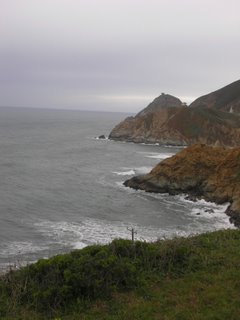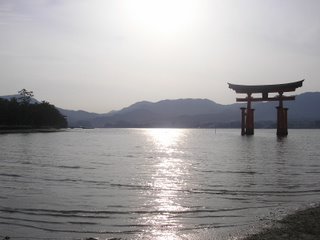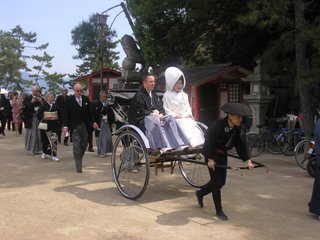Thursday, December 21, 2006
The Highlights
The Reluctant Environmentalist
Bush: The American people expect us to reduce our dependence on foreign oil and increase our use of alternative energy sources. So we must step up our research and investment in hydrogen fuel cells, hybrid plug-in and battery-powered cars…
a. tyrell: If you take a look at the film “Who Killed the Electric Car” you’ll see that not only is the electric car possible, but we already have the technology for it. And I’m not talking about those funny-looking one-seater cars you see on prototype car tests on TV. These are completely regular looking electric cars that regular people owned and used during the early 90s until the auto industry decided that they wanted to take them off the market.
A Bit of an Understatement
Question: Mr. President, less than two months ago, at the end of one of the bloodiest months in the war, you said: Absolutely, we're winning. Yesterday, you said: We're not winning; we're not losing. Why did you drop your confident assertion about winning?
Bush: …My comments yesterday reflected the fact that we're not succeeding nearly as fast as I wanted, when I said it at the time, and that the conditions are tough in Iraq, particularly in Baghdad.
…Victory in Iraq is achievable. It hadn't happened nearly as quickly as I hoped it would have. I know it's -- the fact that there is still, you know, unspeakable sectarian violence in Iraq, I know that's troubling to the American people.
A Remorseful President
Question: Mr. President, Lyndon Johnson famously didn't sleep during the Vietnam War; questioning his own decisions. You have always seemed very confident of your decisions, but I can't help but wonder if this has been a time of painful realization for you, as you yourself have acknowledged that some of the policies you hoped would succeed have not. And I wonder if you can talk to us about that. Has it been a painful time?
Bush: Most painful aspect of my presidency has been knowing that good men and women have died in combat. I -- I read about it every night. I -- my heart breaks for a mother or father or husband and wife or son and daughter. It just does. And so, when you ask about pain, that's pain… But the most painful aspect of the presidency is the fact that I know my decisions have caused young men and women to lose their lives.
Alternative Energy
Bush: nuclear power is going to be an essential source, in my judgment, of future electricity for the United States and places like China and India. Nuclear power is renewable, and nuclear power does not emit one greenhouse gas. And it makes a lot of sense for us to share technologies that will enable people to feel confident that the new nuclear power plants that are being built are safe, as well as technologies that'll eventually come to the fore that will enable us to reduce the wastes, the toxicity of the waste and the amount of the waste. Continue to invest in clean-coal technologies. Abundance of coal here in America. And we need to be able to tell the American people we're going to be able to use that coal to generate electricity in environmentally friendly ways. My only point to you is: We got a comprehensive plan to achieve the objective that most Americans support, which is less dependency upon oil.
a. tyrell: If he’s as concerned with alternative sources of energy and decreasing US dependency on foreign oil as he says he is, what has he been doing in this regard for the last 6 years? I can’t think of a single significant measure proposed by the Bush Administration that was primarily in support of alternative sources of energy. There has been some support for hydrogen fuels and ethanol derived from corn, but given the predicted impracticality and prohibitive expense of hydrogen fuel and the glaring inefficiency of US ethanol production initiatives, I would suspect that support for these technologies has less to do with the environment as it does with covertly protecting agriculture and private industry.
Social Values
Question: …Mary's having a baby. And you have said that you think Mary Cheney will be a loving soul to a child. Are there any changes in the law that you would support that would give same-sex couples greater access to things such as legal rights, hospital visits, insurance, that would make a difference, even though you said it's your preference -- you believe that it's preferable to have one man-one woman...
Bush: No, I've always said that we ought to review law to make sure that people are treated fairly…
a tyrell: What about support for the Constitutional Amendment to ban gay marriage? I wouldn’t view that as a measure that would ensure that all people are treated fairly.
Where’d that surplus go again?
Bush: My message to the Iranian people is: You can do better than to have somebody try to rewrite history [referring to Iranian President Ahmadinejad]. You can do better than somebody who hasn't strengthened your economy…
a tyrell: So I’m still unclear on how President Bush has strengthened our economy. Was it through tax cuts to the rich that led to huge corporate profits, but virtually no growth in wages and very little job growth until fairly recently? Or was it by spending $300 Billion in Iraq over the last 3 years while we continue to fund our deficits by borrowing from China and other nations?
So if the Iranians deserve better, does that hold true for us too?
Monday, December 11, 2006
J'aime New York
This is the first time I've been and I don't know if this was a typical Sunday night, but a few interesting events transpired during the 2 hours or so that I was there. After finishing his set leading the band on the organ, the "Preacher", as he was called, brought to the front an older woman who was there celebrating her birthday with her grandson and his girlfriend. After coercing the crowd to stand and give the 82-year old woman a round of applause, he pulled out a crisp new $100 bill and forced it upon her despite her reservations. I was standing just next to where the woman was seated and as the night progressed, many people came up to her to wish her well. Over time, I began to wonder whether in fact it actually was her birthday. I think that the Preacher had simply misunderstood her and it would have been too awkward for her to say anything to the contrary (let alone give the money back).
Taking over the reigns at the organ, the next band leader invited a young Japanese woman to perform who "scatted" along with the band. She was pretty good and really got into it. I assume she had planned to perform that night, but it look like she was just another member of the audience. Upon completion of the song, the band leader offered her a warm "Arigato Gozaimas" with slight bow of the head as she returned to her seat.
Only in New York.
So all in all, it was really good music, no cover, a cool crowd, cheap drinks (by NY standards), and -- what looked to be -- good soul food. They do this every Sunday. I definitely plan on stopping by again sometime soon.
Saturday, December 09, 2006
Rummy on Trial
Anyway, in deciding whether to let the trial proceed, the judge acknowledges that torture is clearly illegal, but he is worried about what precedent this trial would set if we, in effect, extend the rights of the Constitution to all people everywhere and begin allowing the courts to second-guess any decision the military makes at home and abroad. That's an interesting point. On the one hand, the US military should be held accountable not only if they violate international law, but also if they act in ways that are contrary to American moral standards. But on the other hand, the Constitution is an American document for Americans. Afgani, Iraqi, and other citizens clearly do not fall under the protection of the US Constitution. Referring to Judge Thomas Holden, who is hearing the case, the AP writes,
"Foreigners outside the United States are not normally afforded the same protections as U.S. citizens, Hogan said, and he was wary about extending the Constitution across the globe. Doing so, he said, might subject government officials to all sorts of political suits. Osama bin Laden could sue, Hogan said, claiming two American presidents threatened to have him murdered." (Matt Apuzzo, Houstan Chronicle, 12/8/2006)
Thursday, December 07, 2006
An Unlikely Alternative
The problem, as I see it, is that we’re losing the war in
Let’s face it: going to
So my advice is based on the premise that going to war was a huge mistake in the first place. I think that President Bush should go on national television (which, in effect, means going on international television) and tell the world that he was wrong and that the rest of the world was right and the
I know, it’s never going to happen. No
Saturday, December 02, 2006
Game Theory
I don't know if y'all caught it, but I'm loving the sample of Radiohead's Amnesiac album in the Atonement track.
Quality.
Friday, December 01, 2006
Still No Cure
Thursday, November 30, 2006
Again... no comment
Follow the link to his blog on the right of the screen if you're interested.
Wednesday, November 29, 2006
In response...
First, thanks for your comments. I love to read what other people have to say about topics that I find interesting.
I agree with you that the Americans have the right to purchase and possess fire arms. It's clearly stated in the Constitution. My argument, however, (although not explicitly stated in the original entry) is that maybe owning a gun isn't a right that people should have. It made sense when the threat of British soldiers was on everyone's minds back when the Constitution was drafted, but nowadays, I would assert that it causes more trouble than it’s worth. I concede that there have been many instances in which law-abiding citizens have protected themselves and their families from danger through the possession of a firearm, but that number is dwarfed by the number of people that have been killed due to the fact that it is legal to possess weapons in this country. Guns are potentially dangerous and it takes a level of maturity and training and soundness of mind to ensure that guns aren’t used for malicious ends. The problem, however, is that the ease at which one can obtain a gun is in direct contrast with the level of responsibility one should take on when issued such a potentially dangerous weapon. Ultimately, if everyone who was issued a gun were responsible enough to make sure that kids didn’t get a hold of it or that it didn’t end up in the hands of criminals, I would feel a lot more comfortable with people exercising their “right” to possess firearms. The problem is that many people don’t fully appreciate the gravity of the decision they have made to obtain a gun, and, as a result, guns that have been obtained legally through rights guaranteed under the 2nd amendment go onto murder innocent (and also not so innocent) people.
Furthermore, I wholeheartedly stand by my assertion that I would rather be robbed by a person wielding a paintball gun than a person in possession of a real gun. Obviously, robbing someone is a crime and is scary and is something that no one should have to experience. However, given the fact that people do in fact get robbed, getting robbed with a toy gun is clearly preferable to getting robbed with a real gun because at least with a toy gun, there’s no chance that you’ll lose your life along with your wallet, even if you don’t know that it’s a toy gun pointed at your back at the time.
Banning paintball guns isn’t going to stop people from getting robbed. If someone has made up his mind to rob you, not having had the opportunity to stop at Walmart to pick up a paintball gun isn’t going to stop him.
But again, thanks for you comment. I’m sure there are many things that I write in this blog that people don’t agree with. I’d love to hear from you.
Sunday, November 26, 2006
Is anyone else as worried as I am?
I was home in Baltimore this weekend for Turkey Day and I happened to glance at a copy of the Baltimore Examiner , in which the headline read "Bill aims to outlaw paintball, BB, pellet guns in Baltimore" The Baltimore City Council is considering restricting the purchase and use of paintball and BB guns to licensed entertainment facilities and no longer allowing ordinary citizens to purchase them. The reasoning behind the bill is because these "toy" guns have been used to commit real crimes such as robberies. The irony in all of this is that instead of trying to get rid of toys that look like guns, shouldn't we be trying to get rid of real guns? If I'm going to get robbed on the street, I'd much rather the guy be holding a paintball gun instead of a real gun, so in case he gets nervous and pulls the trigger, I just have to buy a new jacket instead of spending the rest of my life in a wheelchair. I think most people would probably agree with that, but the notion of outlawing real guns isn't even an option. How did we get to the point when the individual right to carry a weapon overrides all appeals to collective security and the common good?
In another example of how American society has become overly militarized, the NYPD has yet again used excessive force against unarmed black men, using the "oh, I thought he had a gun" excuse (the NYPD seems to never get tired of using that one). NYPD fired 50 bullets, only half of which actually landed anywhere close to their intended targets. Has anyone thought that if normal citizens weren't allowed to walk around with guns, maybe cops would be a little less trigger happy? Not to take any blame away from cops because I'm sure everyone (including myself) has their issues with cops, especially the NYPD, but in such a militarized society in which anyone you meet could potentially have a concealed weapon, I could understand a cop being a little jumpy.
My concern, however, isn't limited to ease in which Americans can obtain firearms, but rather my concern extends to the militarized nature of our society as a whole. It would not be difficult to make the argument that the ridiculous amount our government spends on defense has just as much to do with economics as it has to do with actual defense. As proven by German militarization leading up to World War II and our own militarization during the same period, nothing jump starts an economy like gearing up for war. Upon emerging from WWII as the unquestioned western pole of a bi-polar world, the US was reluctant to sacrifice the economic gains reached through militarization, especially with the Soviets nipping at our heals. And even today, with the Soviet threat long gone, war and military build up continues to be one of the main drivers of our economy. I urge anyone who questions that assertion to look at the huge profits defense suppliers and contractors are making through various wars and military operations around the globe and the existence of, by some accounts, over 700 US military bases in over 40 countries. Not only is our society becoming very militarized, but we successfully project our bellicose culture abroad.(This could quite easily lead to a discussion of the false claim that the US has always been the "reluctant" imperialist, but I'll save that discussion for another time).
So I commend the Baltimore City Council in trying to lower crime in the city, but, unfortunately, I fear that the problem of violence in that city or any other across the nation goes much deeper than whether people are allowed to carry around paintball guns.
Thursday, November 09, 2006
Whew...That Was Close
When I powered up my computer Tuesday evening and looked up the election tallies, I was very worried that not only was Ehrlich going to remain the governer of Maryland, but his Lt. Governor was going to pass one of Maryland's Senate seats to the other side of the aisle. Fortunately, however, as more votes rolled in, Martin O'Malley (who I honestly don't really find very impressive)and Ben Cardin came through in the end. After a 4-year identity crisis, it's nice to see that Maryland has come back to its Democratic senses and ended its foolish experimentation with Republican politics.
All is now right with the world.
By the way, was anyone else caught off guard with Bush's sacking of Rummy? If anything, I would have thought he would have given him the axe before the election. Since so many people hated him, firing him before the election might have helped the Republicans a bit. Waiting until the day after is like Bush admitting that he was wrong all along, which is not something that I would have ever expected him to do.
Thursday, November 02, 2006
Ain't the Internet Great?
Sunday, October 22, 2006
Obama in '08??
Is the US ready for a President that's not a white male? One could argue that countries like Germany, the UK, and even Chile, and Liberia are far more progressive than the US because they've elected female heads of state and the US has never even come close. The only serious non-white male candidate we've ever had was Elizabeth Dole, and even her own husband said that she never had a chance. I don't know if the US is ready for a Black President (or a female President for that matter). I'd like to hope so, but I really don't know.
Of course if Obama does decide to run, he's definitely not guaranteed the nomination. Beyond Hillary, there's also John Kerry, Russ Feingold, Joe Biden, and maybe even Al Gore among others to contend with. If you take Obama and Hilary out of the equation, I'd put my money on Feingold or Biden, but unlike last election, there's no dearth of good talent hoping for the Presidential nod. I'd honestly be happy with many of the Democratic hopefuls that are expected to make a run in '08 (with maybe the exception of Kerry. I was never a big fan.).
But before we get too far ahead of ourselves, there's the little matter of midterm elections and control of Congress coming up in a few weeks. Americans generally prefer divided government. Although Republicans have held the legislative and executive branches for the last six years, I believe that if you look back over post-war history, Americans have generally prefered having one party in the White House and a different one controlling Capitol Hill. So if Democrats actually do as well in the upcoming election as people seem to think that they can and they regain control of both houses, it may make a little difficult for the Democratic nominee to take the White House in '08, regardless of who that nominee is. That's not to say that I think we should all go out and vote Republican next month, but if Democrats do regain control of Congress, they're really going to have to get their act together so that they don't mess things up so much to ensure the maintenance of Republican control of 1600 Pennsylvania Ave.
Tuesday, October 17, 2006
Graduate School
One could argue that education is the great equalizer in American society. No matter what your background, no matter where you grew up, no matter what you look like, a quality education can be your key to success and the "American Dream" (whatever that is). While that may be true on some level, whatever truth that assertion holds does not provide much comfort for those that aren't able to pursue graduate education in the first place.
It's no secret that graduate school is expensive -- ridiculously so. And it should also be no surprise that as I look out across the library in which I sit, all I see are White and East Asian faces. Here at one of the preeminant graduate institutions for international affairs in the country in which the vast majority of students enroll because they want to "save the world" and ensure that everyone everywhere has access to the tools they need to not just survive, but to thrive in life, there exists one of the most blatant displays of inequity in the world. How many people can not only afford to survive for two years with no income, but, in addition, pay over $50,000 a year in tuition and expenses? While education may in fact be a great equalizer among men, it's a path that the ones who could use it most aren't able to step foot on. That is the irony I see: everyone here -- myself included -- dream of going on to make the world a more peaceful and equitable place for all, but what do any of us really know about how life really is? What do we know about poverty, war, or struggle that we didn't read in a textbook or watch on CNN?
As I sit here studying economic theory under the watchful eyes of university benefactors immortalized in portraits upon the walls, I can't help but wonder whether we're all fooling ourselves. None of us could possibly follow through on our grand expectations because none of us truly understands what needs to be done. And those out there who do know what needs to be done because they live it everyday, will never have the opportunity to occupy the seat in which I now sit. Most will never have the opportunity to take part in this great "equalizing force" because whoever came up with that notion clearly didn't consider all of the obstacles the average person must overcome before they can even get here.
Well, back to work. These econ problem sets aren't going to do themselves.
Tuesday, September 19, 2006
Lights, Camera, Action
Donnie Darko
Amorres Perros (foreign)
Antwone Fisher
Boys Don't Cry
Central Station (foreign)
City of God (foreign)
A Clockwork Orange
The Godfather (Parts I & II)
The Color Purple
Hotel Rwanda
Il Postino (foreign)
Love Jones
Malcolm X
Maria Full of Grace (kinda foreign)
Paradise Now (foreign)
Requiem for a Dream
Philadelphia
You Can Count on Me
Brick
Anyone care to suggest any other films that you feel should be added to the list?
Monday, September 18, 2006
As if I didn't already have enough to worry about
So, New York, good night, sleep tight and...well, let's just leave it at that.
Monday, September 04, 2006
Cradle To Cradle
Our current goal of simply slowing down the rate at which we destroy the earth isn't viable in the long term. To truly preserve the earth for future generations, the authors maintain that humans need to reintegrate themselves into the natural world. Instead of trying to "tame" nature to suit our needs, we could be like the ant or the cherry tree that recognizes the natural state of things and develops ways to thrive within the natural world rather than in spite of it.
For more info on the authors and their work, check out the websites for Michael Braungart and William McDonough.
Friday, August 25, 2006
Cleantech
While profit motive has led to substantial improvments in quality of life, especially since the industrial revolution, economics does have its limits. I believe that it was John Maynard Keynes (or perhaps Adam Smith) who predicted that as a result of the increased interconnectedness of nations, war would be a thing of the past. By its very nature, war disrupts the free flow of capital, and, by their very nature, human beings are extremely reluctant to willingly pass up financial gains. Clearly, he was wrong. Maybe humans' need to conquer is the only thing that surpasses our greed. Although we may be stuck with war through the end of time, I hope at least that our desire for wealth accumulation will lead us to a cleaner, prettier world in a generation's time.
Monday, August 14, 2006
No Comment
Populism for the Information Age
I use President Bush as an example, but the same holds true for all politicians. When was the last time a politician truly tried to communicate with voters? When we step into the voting booth, do any of us really know what the idealogy and motivation is of any of the men and women who appear on the ballot? Our nation was basically founded on idealogy. Alexander Hamilton, John Jay and James Madison set out to communicate this idealogy when they published the Federalist Papers to advocate the ratification of the US Constitution. They methodically went through the theory of government as they saw it. Once the men were in office (Madison as our 4th President and Hamiliton as Secretary of Treasury), there was no question of where they stood on certain issues because there was a standing document laying it all out. I don't know whether any subsequent electorate has had the opportunity to make a truly informed decision when casting their votes. Therefore, I applaud President Ahmadinejad's effort to connect with the average Iranain voter. While I may not agree with what he says, I definitely commend him on his courage to state his beliefs and let the Iranian people decide what they think.
If you'd like to take a look, here's a link to his blog, complete with an internet poll about whether you think the US and Isreal are intentionally trying to incite another World War through an attack on Lebanon. As it stands right now, 45% think 'yes' and 55% voted 'no'.
Tuesday, August 08, 2006
The End of Poverty
Sachs attempts to write a roadmap for ending extreme poverty over the next two decades, a goal championed by the United Nations' Millienium Goals. Despite the seemingly impossible task he sets out for himself at the start of the book, I finished the book convinced that it was all very possible and that he had the strategy to accomplish it. It's quite an amazing book. He starts out by setting the stage: presenting the most challenging regions to gloabal developement. He then goes on to give specific reasons as to why some countries have achieved development while others have not, despite the fact the all countries started off at basically the same starting point back in the 17th Century when everyone was poor. Next, he chronicles some of the work that he has done personally in Bolivia, Poland, Russia, etc. to battle hyperinflation and help get those countries back on track. After laying out the case and what needs to be done, he spends the second half of the book detailing how to do it, how to pay for it and why it's in the interest of the rich to actually do it. I was thoroughly impressed by the whole endeavor.
Now that Sachs has clearly shown that it is indeed possible, at least theoretically, to end poverty by 2025 (the target date of the UN Millenium Development Goals), the really hard part is to convince world leaders and the electors in democratic societies to actually do it. How we accomplish that goal isn't covered in this book, but maybe that's someone else's job. With this book, Sachs has led us to the water, but now it's up to the rest of us to take a drink.
Monday, August 07, 2006
Sunday, August 06, 2006
Big Love
One woman that I met there had been dating a married man for several years. After 9 years of what I would characterize as him stringing her along, she learned that he had made a pact with his wife to refrain from taking another wife despite the aspirations of the woman that I had met, who was hoping to become wife number 2. As the situation stood by the time I left, as relayed to me by my friend, the woman and the married man were actively trying to pursuade the wife to release the husband from his aggreement so that he could take a second wife. What seemed odd to me as a westerner, was not so much that the woman was willing to be wife number 2, but the fact that she was the one most actively pursuing that position. Although she was well aware that she would be playing second fiddle to his first wife for the rest of her life, she had decided that she wanted to be with this man and was determined to convince his wife to allow her into their family. The whole situation seems so opposed to our notions of feminism here in the west. There just seems like there is something inherently wrong with her pursuing such a position of inferiority. However, different cultures have very different rules and norms. Maybe from her point of view, asserting her desire to be with this particular man was her form of self-empowerment. Maybe it's not about the man at all. Maybe marriage to her is simply a tool to gain greater access in society so that she can more easily accomplish her goals in life. Or maybe not. Who knows. I just think it's all very interesting.
Tuesday, July 11, 2006
Dakar: First Impressions
Secondly, this was the perfect time to come because I don't think I would have been able to appreciate it here had I come before now. Looking back on my time in Austria and China and even as recently as my trip to Japan this spring, i needed those experiences to get me ready for Africa, which is where I've been really wanting to go all along. I believe that some people are born ready to spend time in Africa, some are probably never ready to come to Africa, I just needed some time to learn how to really appreciate life outside of the US before I came. Otherwise, I probably wouldn't have enjoyed being here. But this is still the first week. Let's see how I feel in a month.
So enough about me. Let's talk about dakar. First, the Senegalese are beautiful. Of course, not everyone is gorgeous, but many many are. Both men and women alike. They tend to have tall, slender, naturally toned bodies with absolutley beautiful very dark skin. I find myself going off course following people walking down the street because they're so beautiful and I'm not ready to stop looking at them yet.
The food. The food is so good. The meals seem very simple (fish or chicken, vegetables and rice), but it is so good. Since it's right on the coast, there's an abundance of seafood, and I don't know how they cook it, but it's so very tasty. I just had a whole fish today for lunch and I think I may have another one tomorrow... or maybe even later tonight. This is food at a restaurant that's so good. When we go to someone's home, it's even better.
Contrary to my impressions beforehand, Dakar ain't cheap! Many things are pretty much on par with the US in terms of price. My meal today (fish, rice, a bottle of local beer) cost me about 10 or 11 dollars. The same meal at a comparable restaurant would've probably cost me about 15 or 16 in Baltimore and maybe 20 in San Francisco ( as an aside, SF is expensive, in my opinion). While it's cheaper than the US, it's really not all that cheap. I was expecting China prices, and I was clearly mistaken. Talking to one of my friend's (very wealthy) Senegalese friends, I also learned that real estate in Dakar is very expensive. Maybe more expensive than much of the US. Other things are really cheap, however. For example, my language class is only 200 dollars for 100 hours of instruction (i.e. 2 dollars an hour). The programs I was looking at in France wanted 230-250 dollars a week for about 20 hours of instruction. So some things here are rather pricey, while others are pretty cheap.
Not only is this my first time in Africa, but it's also my first time in a predominately Muslim country. Although I get the impression that Senegal is a rather secular Muslim country (more of what I imagine Turkey to be as opposed to my impression of Saudi Arabia), I find it all pretty interesting. I took the bus home after class today, and on the way home I saw the faithful flooding the streets and outdoor markets as the Grand Mosque emptied after, I presume, the conclusion of Friday afternoon prayers. There were men carrying prayer rugs and beads everywhere. Some were adorned in traditional dress while many just had on a t-shirt and pants. It was pretty cool.
Dakar, not unexpectedly, is very homogenous. I'm sure there are different tribes that make up the population here, but with my untrained american eyes, I just see a lot of black people. I mean, that's great and part of the reason i came here, but still, it's not very unlike Tokyo or Beijing in that regard. Interestingly enough, also not unlike Beijing and Tokyo, the Senegalese can pick me out of a crowd in an instant. Eventhough I feel like I blend in here a lot more than i ever could in Beijing or Tokyo, i'm as much a foreigner to the Senegalese as I was to the Chinese or Japanese. Of course the fact that I don't speak french is a dead giveaway, but i don't even have to open my mouth for people selling stuff on the street to approach me with what little English they have.
Just a few moments ago, I a Senegalese woman tried to pick me up in the internet cafe. Although she broke the ice asking me whether I worked here, she knew good and well that I didn't work here the moment she laid eyes on me. In China there was a very interesting dynamic between Chinese women and foreign men. Many women in China saw the potential to lure a (presumed) wealthy foreigner (which i imagine is common in many developing countries). I'm interested in seeing whether it will be a similar dynamic here in Senegal.
So that's my take on Dakar so far. One other activity of interest that I've taken part in is a trip to the Pink Lake a few days ago. It's literally pink and hella salty! Apparently, there are minerals in the water that provide favorable conditions to a certain type of algae that glistens pink when the sun's rays hit it. But the other cool part is that it's so unbelievably salty that you literally can't help but float. You can't really even swim because almost your entire body is floating on top of the water. It's pretty cool, but if your unfortunate enough to get some water in your mouth or, even worse, in your eyes, the whole experience instantly becomes a lot less enjoyable.
Friday, June 30, 2006
A Bientot!
Believe the Hype
The story opens with the very unassuming tale of a god-fearing boy growing up in India raised by zookeeping parents. When the family embarks on a journey to Canada by boat with several of their animals, however, things get a little out of the ordinary. Without providing any more detail than you would get from the outside of the book jacket, the ship sinks and the boy finds himself alone on a life boat with a 450-pound Bengal tiger floating somewhere in the Pacific.
Martel is an excellent story teller. He spends about two-thirds of the novel in the exact same setting on the life boat, with the exact same two characters (only one of whom actually speaks) and somehow tells a riveting story set in a seemingly mundane environment. While on the one hand, I was eager to learn what would happen next, on the other hand, I didn't want the book to end.
Anyone's who's read it, please do drop me a line. After briefly discussing the "believing in God aspect" of the book over a beer last night, my friend Mark made a very interesting point. I don't want to make the point now because I don't want to spoil the ending for anyone.
In a rare move away from contemporary fiction, for my next book, I've chosen The End of Poverty by Jeffrey Sachs. Although I feel that Professor Sachs could have chosen a more compelling figure to write the forward than Bono, Sachs is one of the most interesting people in development economics today. As the head of Columbia University's Earth Institute, professor at Columbia's School of International and Public Affairs, and Kofi Annan's appointee to spearhead the United Nation's Millenium Goals Project, Sachs is definitely an intellectual force to be reckoned with. I just picked up the book this evening. I'm about 20 pages into it, and already I'm a big fan. I'm looking foward to getting deeper into it and also for the opportunity to discuss some of the major themes with Professor Sachs when I start my Masters of International Affiars program at Columbia in the fall.
Friday, June 23, 2006
John Henry Days
I like reading fiction by people I feel are smarter than I. There's a certain style of writing that I particularly enjoy. I've read many novels that I would put in this category - most notably Infinite Jest by David Foster Wallace and Another Country by James Baldwin - but I find it most rewarding when I can find that style of writing in a modern African-American author. In an earlier entry, I've discussed the difficulty I have in finding quality contemporary African-American fiction, so on the rare occasion that I do find it, I feel the need to share the news with as many people as I can.
I'm looking forward to reading his first novel, The Intuitionist.
Currently I'm about halfway through Life of Pi by Yann Martel. In case there are a few people out there who haven't read this book already (I honestly think that I'm the only person on earth who hasn't read this book already), it's been a very good read so far.
Bitter Sweet
To the US's credit the foul called against Onyewu in the box that resulted in a penalty kick for Ghana, at which time they scored their second goal, was a bad call. There was clearly no foul. But it really wouldn't have mattered either way. The US needed to win this game to make it to the second round. If it weren't for that penalty kick, they would have only tied. So either way, the Americans would've been sent home.
The title of this post is Bitter Sweet because although I'm disappointed that the US didn't make it out of the group, I'm very excited that Ghana did. They're the only African team to make it out of the group stage. I was rooting first and foremost for the Americans coming into the tournement, but secondly, I've been rooting for the four sub-saharan African teams to suceed. Ghana is the only one to do so. Unfortunately, however, their first match out of the group stage is against reigning champs Brazil, but you never know. I don't think many people expected Ghana to make it this far. Maybe they have one more upset still in them.
Tuesday, June 13, 2006
World Cup Fever
As a red-blooded American, I'm of course rooting for US all the way. I'm also pulling for the African teams to have a good showing this year. So far, I've seen the Argentina -- Cote d'Ivoire match in which Cote d'Ivoire lost 2-1. The Ivorians did manage to score a goal to tie the game in the last 10 or 15 minutes of play, which made things a lot more exciting for a little while. However, the Argentines went on to win. This afternoon the Ghanaians lost to the Italians 2-0. I only saw the first half of the game and although Ghana went on to lose the game, I thought that they were playing a good game. They had several shots on goal. They were able to get inside the box on several occasions, but had difficulty in the final execution, which is all that really matters in the end. But a pretty good showing overall against Italy that's known for it's defense. The Americans, on the other hand, are another story. They really sucked it up today. They were terrible, losing to the Czech Republic 3-0. The whole team only had like 4 or 5 shots on goal the entire game. Tomas Rosicky, who scored 2 of Czech's goals, had three shots on goal all by himself! I really need to have a talk with the guy that came up with the model that ranked the US at number 5 in the world coming into the competition. The US is really going to have to step it up or else they won't even have a chance against Italy on Saturday. By the looks of how poorly the US played today and how well the Ghanaians played during the first half of their game, I'd have to say that the US may even have a tough time taking on Ghana. To their credit, however, Claudio Reyna of the US was agonizingly close to scoring a goal in the first half. It was literally off by an inch or two, and the play leading up to the shot was beautiful. They had some really good team work moving the ball up field and the shot was set up perfectly, but no matter how close it was and how beautifully it was set up, the ball still didn't go in the goal. And even if it had, that was the only well executed play of the game. Had they made that shot, they still would have lost by 2 points.
Land of the Rising Sun
Saturday, May 27, 2006
Buy me some peanuts and... ramen?
I was just in Hiroshima the other day, where I was able to catch a baseball game between the Hiroshima Carp and the Blue Buffalo from some undetermined city in Japan. The Japanese really love themselves some baseball. Not speaking any Japanese, I found myself sitting in the section of the opposing team (which crushed the hometeam by like 7 - 2). It was awesome! The Japanese take baseball very seriously. I don't think I even watched much of the game. I was too busy looking at all of the crazy fans in the bleachers.
Baseball in America is a very subdued spectator sport. There may be a few profanities thrown at the umpire for making a bad call every once in a while, but that's pretty much the extent of it. It's a very different story in Japan. Not only are the crowds yelling and chanting practically the entire game, but there are also huge banners and flags being waved, drums being beat upon, and bands of trumpeteers making the rounds. With a few opening lines, the band leader gets up, signals the drums and trumpets to start playing and the entire crowd joins in on the fight song chosen from their seemingly infinite repetoire. It's pretty cool. And pretty insane. While I had absolutely no idea what the people were chanting, I joined in as much as I could and I made a couple friends in the process. Although neither of us could speak the other's language, the fact that I was clearly cheering on their team garnered me a couple of hi-fives at key points during the game. It was fun. And for only 15 bucks, it was one of the few things in Japan that's actually reasonably priced.
Friday, May 19, 2006
I'm Lovin' It!
Secondly, and most importantly, I love visiting McDonald's abroad for the apple pie. Unlike in the US, which has somehow successfully blamed the fast food industry for it's chronic obesity, it's been my experience that you can still get the fried apple pie in every McDonald's abroad, as opposed to the baked version available in the US. Apple pie isn't supposed to be healthy. It's just supposed to taste good. By choosing to only bake their pies, the US stores have successfully put a desert on the market that is neither good for you, nor tastes good. I don't see the point.
So this entry is coming at you all from my friend's apartment in Tokyo, where I had the pleasure today to experience one of those beautifully crispy and greasy and fatty deep-fried apple pies. Mmmmmm.... just like Mom used to make.
Monday, April 10, 2006
Paradise Now
The second reason why I thought that this was such a great movie was because it did an excellent job of humanizing the characters. The two men weren’t simply suicide bombers. They were sons, and brothers, and friends, and auto-mechanics, and dreamers, and believers. They hadn’t been captured, brainwashed and coerced into carrying out this mission. They accepted the mission willingly. We saw a glimpse of how their lives are and had been on the West Bank: lives that caused them to believe in the mission they were on the verge of executing.
Furthermore, I felt that there was no judgment made. The film followed two men during the course of two days in their lives. There as no commentary on the paths that each chose. There was merely the depiction of those paths and a look into some of the events that led them to where they ultimately found themselves at the end of the film. Many people on both sides of the conflict feel very passionately about their position, and it was refreshing to see one side of the issue without the usual biased critique built in.
If anyone else has had the opportunity to check out this film, I’d love to read your comments.
Saturday, April 01, 2006
Half Moon Bay
The trail basically meandered up the side of a mountain. Well, I don't think it would qualify as a mountain, but it was definitely much bigger than a hill. The visitors’ center lady said it would take about 2 hours to make it to the top. It was awesome. For all of you out there in Northern California, you know that it's been raining pretty much non-stop for the last month, but luckily it was pretty dry the first half of yesterday. When I parked the car at the foot of the trail, I looked up and saw some clouds looming up above, but there was still no rain. About an hour into the hike, I realized that I was actually inside the cloud that I was looking at from down below. It was pretty cool. I hiked onward for another half an hour or so, but as I walked, the conditions were becoming less and less hospitable as the cloud prepared for the torrential downpour that was to take place in about a half an hour's time. I turned around and started my way back down the trail because with all of the wind and hail, the hike wasn't quite as much fun anymore. But I must say, it was very cool being inside a cloud right before it started raining.
Not wanting to drive back to San Francisco in such heavy rain, I stopped at a great restaurant in downtown Half Moon Bay called the Half Moon Bay Inn. Their apple cobbler with butter pecan sorbet was out of control. I definitely recommend it. Then I went to Obester Winery for some wine tasting. This place, however, I do not recommend. The whites were terrible. I actually just skipped two of them because I couldn't handle it. The reds were slightly better, but only slightly. Eventhough you have to drive right past the place on the way back to the 280 back to San Francisco, it's not worth stopping in. It was that bad.
Here are a few shots from my adventure:





Monday, March 13, 2006
Buddha’s on the Loose!!!
Wasting time at work – which I find myself doing more and more these days – I stumbled across this article about how this 15 year old kid named Ram Bahadur Banjan, who is believed to be the reincarnation of Buddha, has mysteriously vanished. He's been sitting under a tree 100 miles south of Kathmandu meditating for almost a year, supposedly without food or water. Furthermore, observers say he hasn’t even so much as taken a piss for the last 6 months.
I found the story oddly fascinating until I read that his keepers don’t allow anyone to view him after sundown, at which point they erect a screen blocking the view of the boy. That’s a little suspect. In any case, he’s vanished and no one knows where he went and only his clothes remain behind.
So if you happen to see a 15 year old boy walking through the Nepali forest in the middle of the night in just his boxers, don’t be alarmed. It’s just Buddha.
Is the United States Headed towards Dictatorship?
This brings up an interesting point: Could the United States – the ostensible champion of democracy around the world – find itself the subject of tyrannical rule? How do dictatorships begin? Could it be argued that Stalin, Hitler, Mussolini and even Chairman Mao would not have been able to seize such far-reaching authorities if the conditions in their home countries weren’t already ripe for dictatorial rule? Perhaps the dictators of the 20th century were merely products of their environment. If that’s the case, what were the original factors that contributed to that environment? According to Justice O’Connor, the lack of an independent judiciary certainly could have been one of them. But there has to be more to it than that, right? What other factors could be involved? Certainly in the case of Germany, economy played an important role in the rise of Hitler. There’s nothing that jump-starts an economy like gearing up for war. With the strongest, most dynamic economy in the history of the world, surely the United States will never find itself in such a dire economic situation that Germany found itself following World War I, right? Perhaps. Let’s take a look at our national debt and current account deficit, which are hovering around $8 trillion and $800 billion, respectively! I’m no economist, but I do know that for us to sustain such a high debt, we must be getting support from somewhere, and much of that support is coming from China. This potentially puts us in a difficult position. Currently, it’s in China's interest to snap up US Treasury securities which help fund our deficit, but what if that were to change? What if China decides that it no longer wants to continue funding our deficit? What if Beijing decides that it would rather sell its vast reserves of US currency and securites on the international market, thus causing the dollar to sink and sending our economy into turmoil? That is probably unlikely today, but maybe a little less unlikely if China decides it wants to invade Taiwan and threatens such economic actions if the US makes good on its promise to intercede militarily on Taiwan’s behalf. A sudden and precipitous drop in the greenback (which, incidentally, is no longer so green anymore), could cause enough turmoil – along with the coincidental coordination of other factors – to provide the opportunity for some form of authoritarian regime to seize power. Unlikely? Perhaps. Impossible? Definitely not.
Ok, so we no longer have an independent judiciary and our economy is in ruins, but the American democratic spirit is strong. We have the benefit of generations of free speech and transparent government and vibrant civil society to shield us from evils of tyrannical government, right? Maybe… maybe not. As we have witnessed all too often, government lies. Government lies to itself and government lies to its people. As I mentioned before, I’ve spent some time living in China. I was there during the SARS epidemic. Talking to ordinary Chinese citizens, I was astounded by the fact that they actually believed anything that their government tells them. Their government has blatantly lied directly to their faces and to the international community for decades. Why, after all of that, do they put any faith in government’s word? Upon further consideration, however, I found that Americans were really no different (and I suspect neither is any other nation for that matter). Who shot President Kennedy? Lee Harvey Oswald? Think again. Who shot Martin Luther King? James Earl Ray? Doubt it. Why did we spend decades fighting a war in Vietnam that we ended up losing anyway? To protect freedom and stop the spread of Communism? Maybe that’s how it started, but the reason it continued so long was probably to line the pockets of the guys in charge. In a more recent example, thanks to President Bush, your phone line is probably being tapped right this minute and there’s not a damn thing you or anyone else can do about it. Government lies. It’s a fact of life that, unfortunately, we have come to accept without question. A long history of misinformation, lies and cover-ups sound like a great environment for a nascent dictatorial regime to prosper, if you ask me.
All in all, perhaps Justice O’Connor speech exaggerates the potential long-term effects of recent Republican rebuke of the judiciary, but, nonetheless, no one doubts the merits of an independent judiciary. Although it is probably very unlikely that the US would begin to spiral towards anti-democratic, authoritarian rule, for us to remain the champion of democracy around the world, we really need to first get our own house in order.
Life on Saturn? ... well, not quite
Saturday, February 25, 2006
The Latest on Darfur
The Bush administration took the bold move of labeling the atrocities in Darfur as "genocide" and vowed to take steps to ameliorate the situation. To the administration’s credit, Deputy Secretary of State Robert Zoellick has actually been on the ground in Darfur four times in the last year and the US Ambassador to the United Nations, John Bolton, has been pressuring the UN to get more involved. Nevertheless, nothing concrete has been done. They talk a good game, but in the end, things are clearly getting worse.
Currently, the only organization that can claim to be really taking action in Darfur is the African Union, which has maintained a small force in the region for quite some time. The AU's 760 troops are hardly enough to bring about peace in an area the size of Italy - even with some airborne assistance from NATO - but at least they're giving it a shot. Credit can also be given to Nigeria, which is positioning itself as a major political player in Africa, a role heretofore played almost exclusively by the South Africans. By hosting peace talks among the government and the warring groups, the Nigerians have been stepping up to the plate in terms of finding African solutions to African problems.
Back to the US, there are finally talks in the UN of getting some UN boots on the ground in Darfur. The UN already has a number of blue helmets in southern Sudan, but it currently has no presence in Darfur. Championing UN involvement in the region is the United States. Like always, the main hurdles to any action taken by the Security Council are Russia and China (and sometimes France). I don't know where Russia stands on the issue, but I just read recently that the Chinese are beginning to warm up to the idea. If China lends its support, or at least doesn't oppose it, it would be a huge step in the right direction. But even if we got the support of all of the permanent members of the Council, it would be quite some time before we began to see UN troops on the ground. First, they would have to assess the necessary level of involvement, and then they would have to get countries to provide troops and then, of course, they would have to figure out how they're going to pay for it. It could be another year before all of the details are worked out, and in the meantime, Darfurians will continue to be raped and murdered and forced from their homes. Until the issues are worked out, there is some talk of simply providing African Union troops with blue helmets and maybe providing increased logistical and air support from NATO and possibly the European Union. There is also talk of NATO simply taking over operations there. I'd be interested in seeing whether the French would go along with that. Even though they're no longer really a part of NATO, I'm sure they would make their voices heard if they oppose. With Merkel running things in Berlin now, I'm sure gaining German support won't be an issue.
Originally, I fully commended the Bush Administration in finally doing something right and using its might and power and resources to actually try to make the world a little more peaceful instead of pissing everybody off, which it's so good at doing. Then, however, I read this article out of China from the People's Daily Online . I used to live in China and while I definitely know that anything coming from the Chinese government or the Chinese media (which are basically the same thing) needs to taken with a gigantic grain of salt, the article does raise some interesting points about the motivation behind the Administration's support for greater involvement in Darfur. It cites the usual motivations that have become all too common with Bush, i.e. the pursuit of oil and the dismantling of Arab society. Maybe the People's Daily is right, but this time, I don't really care so much. As long as the Administration does the right thing, I'm not too concerned with the real motivations behind it. That statement might come back to bite me in the ass one day, but so be it.
Here are a couple more interesting links to info about Darfur. NPR did a very interesting interview with Brian Steidle, a former US Marine who was a consultant with the African Union and now travels around the US trying to drum up support for involvement among US politicians. For a good current snapshot of what’s going on, check out this article in the Economist .
Monday, February 13, 2006
Give Credit where Credit is Due
I was hoping to insert a link to the Times, but that article has already been archived and they charge 4 bucks to view it. So here's a link to the Yurica Report, which was smart enough to copy and paste the whole article on their site before the NYT archived it.
By the way, I'd like you all to make special note that this entry marks my very first crack at writing in HTML. It's actually so much easier than I expected, especially with the help of my man Jeeves.
Saturday, February 11, 2006
Black Fiction
This experience makes me wonder about the state of the African-American community as a whole. What does it say about our community when the major themes pervading our literature center around sex, violence, gang membership and the like. Is that all that we care to read about? Are those the only themes that are “Black enough” to garner our support? Or is it that those are the only themes that major publishing houses care to bring to market? Is this a reflection of us, or is it a reflection of society’s image of us? I don’t know the answer to that question. Of course, I would love to put the blame squarely on dominant (i.e. White) society, but I don’t know if that’s actually the case. Perhaps African-Americans today just like reading frivolous literature. If there weren’t a market for it, it wouldn’t be on the shelves. Or maybe African-Americans only read these works because that is the only literature readily available. I really don’t know, but I guess just as long as people are reading something, I can’t be too mad.
Maybe this all just means that I need to stay away from places like Borders and Barnes & Noble when I’m in the mood for works by African-American authors. There are many very well stocked Black bookstores, including Marcus Books here in San Francisco, that have an excellent selection. It’s just so hard to pass up that 20% off coupon waiting in my inbox each week.
While we’re on the subject, here’s a few of my favorite novels by African-American authors (in no particular order):
Another Country, James Baldwin
Invisible Man, Ralph Ellison
Song of Solomon, Toni Morrison
The Darkest Child, Delores Phillips
The Color Purple, Alice Walker
Wednesday, January 25, 2006
San Francisco II

Crash

Driftwood & Footprints

Flood

Log & Surf
Sunday, January 22, 2006
San Francisco I

Golden Gate Bridge I B&W-- this is the very first picture of the GG Bridge that I've ever taken.

Golden Gate Bridge II B&W

Sea Foam B&W

Man and Kite B&W











